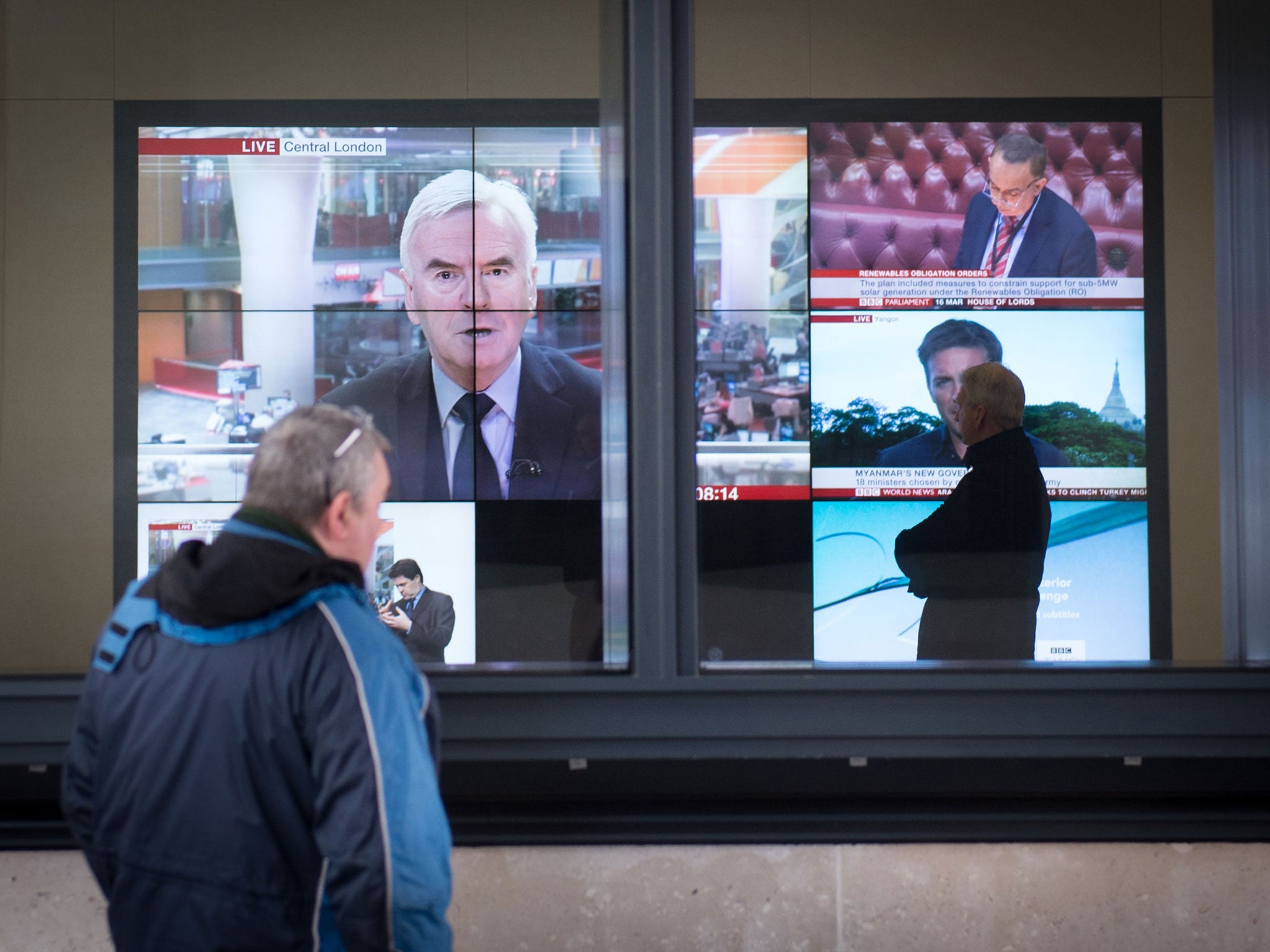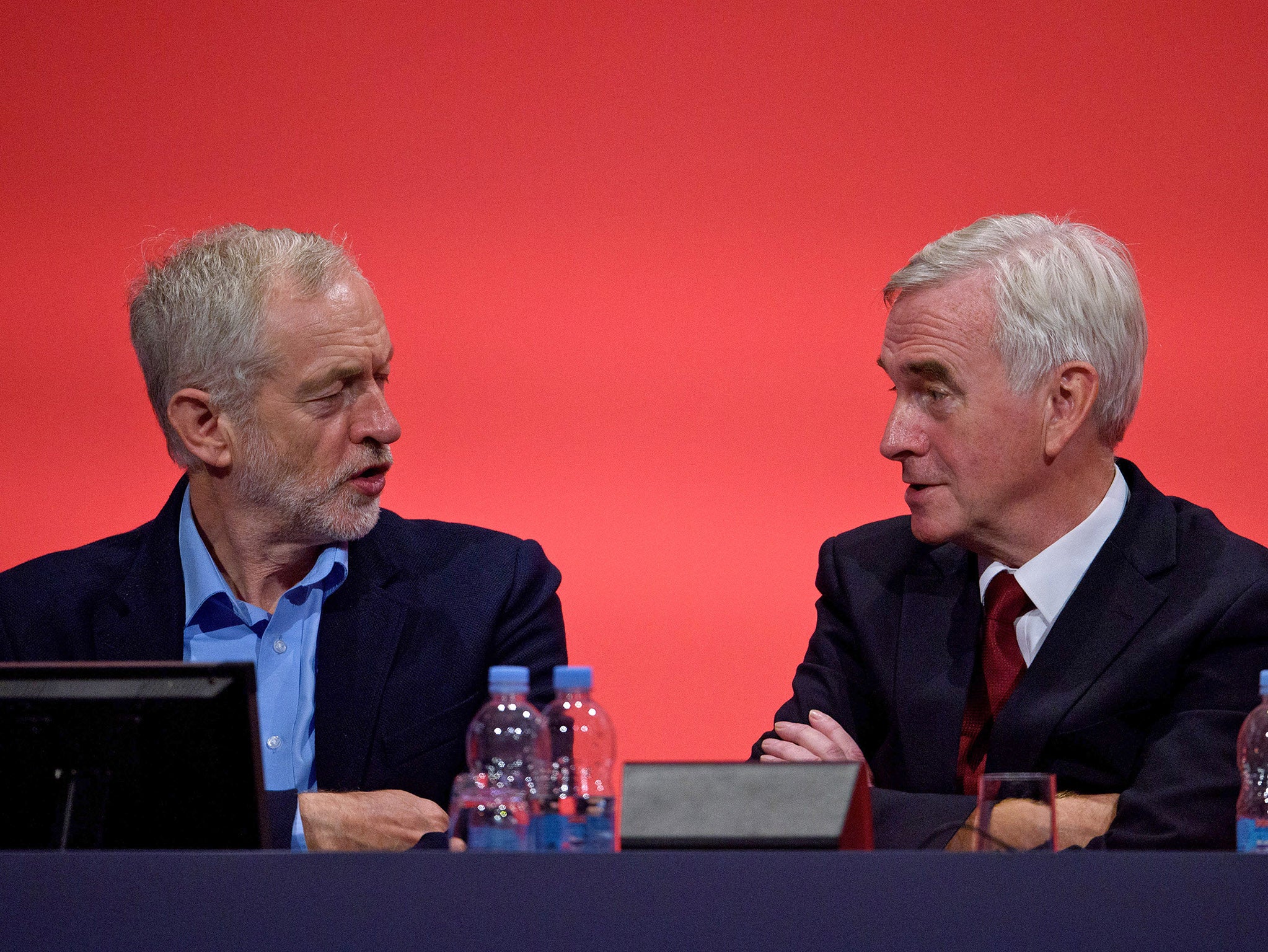Your support helps us to tell the story
From reproductive rights to climate change to Big Tech, The Independent is on the ground when the story is developing. Whether it's investigating the financials of Elon Musk's pro-Trump PAC or producing our latest documentary, 'The A Word', which shines a light on the American women fighting for reproductive rights, we know how important it is to parse out the facts from the messaging.
At such a critical moment in US history, we need reporters on the ground. Your donation allows us to keep sending journalists to speak to both sides of the story.
The Independent is trusted by Americans across the entire political spectrum. And unlike many other quality news outlets, we choose not to lock Americans out of our reporting and analysis with paywalls. We believe quality journalism should be available to everyone, paid for by those who can afford it.
Your support makes all the difference.Labour’s shadow chancellor John McDonnell is calling on Labour to support a change in the voting system to proportional representation, the Independent can reveal.
Mr McDonnell, a close ally of the Labour leader, said the current voting system was allowing the Tories to force “extreme” measures on a country despite only winning 36.9 per cent of the vote.
The shadow chancellor signed a declaration in support of the policy this weekend and joins seven other Labour MPs from across the party who put their name to a letter to Jeremy Corbyn in support of PR.
Mr Corbyn has previously said he is open to electoral reform – but has stopped short of fully endorsing a change to PR, suggesting the subject needs more investigation.
“It should be no surprise that there’s massive opposition to so many of the present government’s flagship policies,” Mr McDonnell said.
“The stark reality is that most voters explicitly rejected the Conservative manifesto last year, and yet we all must suffer a majority government as it tries to force these extreme measures upon an unwilling country.
“If we are serious about democracy which we certainly should be we can’t accept this. Parliament draws its legitimacy from representing the will of the British people.
“When Parliament fails to represent the people so flagrantly, it risks ceasing to be legitimate.”
Labour MPs Ben Bradshaw, Paul Blomfield, Stephen Kinnock, Clive Lewis, Jonathan Reynolds, Chuka Umunna, and Daniel Zeichner, signed a letter to Mr Corbyn this week.
Mr McDonnell’s call coincides with a major street demonstration in Westminster in support of a cross-party campaign for PR, organised by the Make Votes Matter alliance.

That campaign seeks to unite Britain’s parties in cross-party agreement to change the voting system by 2021.
The support of Mr McDonnell – arguably the second highest ranking politician in the Labour party – is a big win for the campaign, and could see Labour join the Liberal Democrats, Green Party, SNP, and Ukip in signing up to support a change in the voting system.
Labour has historically been split on the subject of electoral reform, with some elements in the party opposing it on the basis that it would make Labour majority governments more difficult to win.
Under the UK Parliament’s existing First Past The Post (FPTP) electoral system, parties win seats in numbers that do not reflect the proportion of votes cast for them at the general election.
In 2015, Ukip won 12.7 per cent of the vote but only one of 650 seats in the House of Commons – while the SNP won 50 per cent of the vote in Scotland but 56 of its 59 seats.
Defenders of the status quo say the current system creates a link between MPs and their constituents, but other voting systems – such as Single Transferrable Vote (used in Ireland) or the Additional Member System (used in London, Scotland, and Wales) maintain this link while producing proportional results.
In January this year The Independent on Sunday reported that Mr Corbyn was in secret talks with the Liberal Democrats over the possibility of joining an electoral alliance in favour of proportional representation.
During the Labour leadership election last year Mr Corbyn said he would consider adopting the Additional Member System but made no pledge to do so.
The UK held a referendum on changing the voting system to the Alternative Vote system in 2011; AV is not proportional, however, and the proposal was rejected by a large margin.
More recent polling from December 2015 shows the public now broadly back a proportional voting system, however. The BMG survey shows 57 per cent of the public agree with the principle that “the number of seats a party gets should broadly reflect its proportion of the total votes cast” – compared to only 9 per cent who disagree.

Join our commenting forum
Join thought-provoking conversations, follow other Independent readers and see their replies
Comments